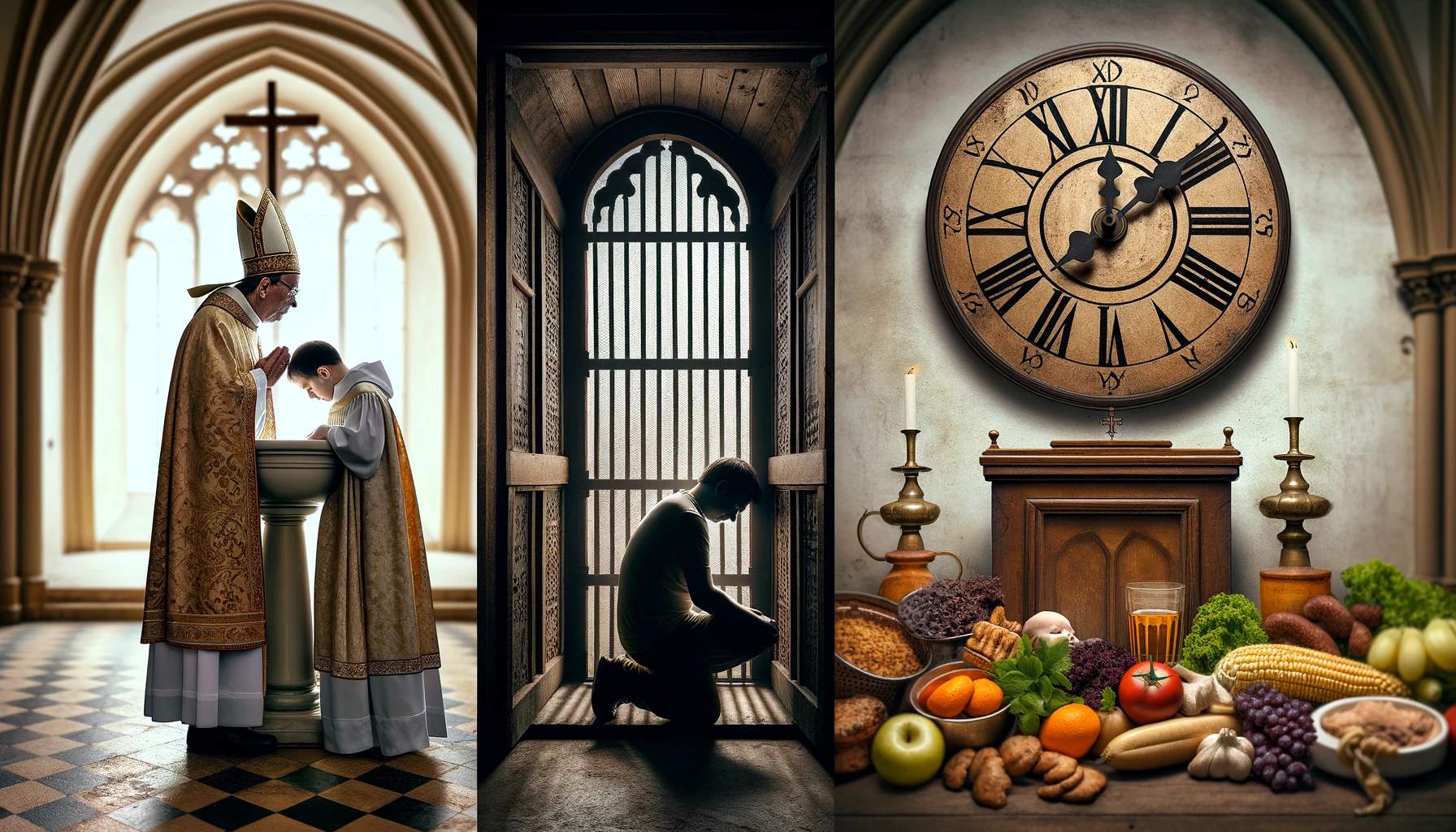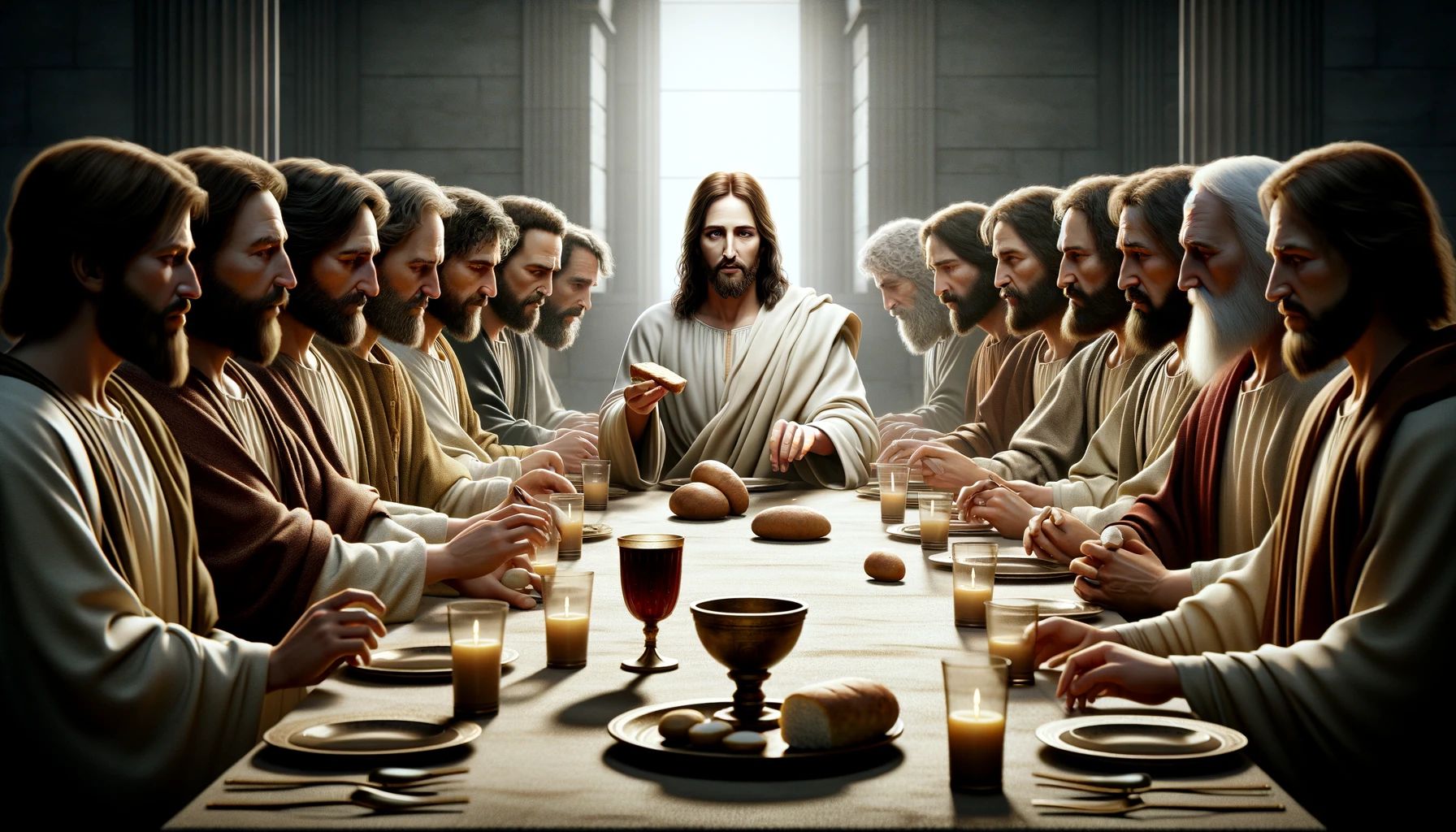Home>Theology and Spirituality>What Is Holy Communion?


Theology and Spirituality
What Is Holy Communion?
Published: February 19, 2024
Jason DeRose, Managing Editor at Christian.net, uses his expertise in religion and journalism to deepen understanding of faith's societal impacts. His editorial leadership, coupled with a strong academic background, enriches the platform’s diverse content, earning him recognition in both journalism and religious circles.
Discover the significance and practice of Holy Communion in theology and spirituality. Learn about its importance and symbolism in Christian faith.
(Many of the links in this article redirect to a specific reviewed product. Your purchase of these products through affiliate links helps to generate commission for Christian.net, at no extra cost. Learn more)
Table of Contents
Introduction
Holy Communion, also known as the Eucharist or the Lord's Supper, holds a central place in the Christian faith. It is a sacred ritual that symbolizes the atoning sacrifice of Jesus Christ and the spiritual nourishment of believers. This profound practice has been observed for centuries, serving as a cornerstone of Christian worship and a source of spiritual sustenance for countless individuals.
The significance of Holy Communion transcends mere symbolism, as it is deeply rooted in the teachings of Jesus Christ and the early Christian church. Understanding the origins, elements, and spiritual meaning of this sacrament is essential for grasping its profound impact on the lives of believers across denominations. As we delve into the depths of Holy Communion, we will uncover the rich tapestry of spiritual significance woven into this timeless tradition.
Read more: What Happens In Holy Communion
The Origins of Holy Communion
The origins of Holy Communion can be traced back to the Last Supper, a momentous event in the life of Jesus Christ. According to the Gospels of Matthew, Mark, and Luke, the Last Supper took place during the Passover feast, a significant Jewish celebration commemorating the Israelites' liberation from slavery in Egypt. It was during this sacred meal that Jesus gathered with his disciples in an upper room in Jerusalem to share a final meal before his crucifixion.
During the course of the Last Supper, Jesus took bread, blessed it, and broke it, giving it to his disciples, saying, "Take, eat; this is my body." He then took a cup of wine, gave thanks, and offered it to his disciples, declaring, "Drink from it, all of you; for this is my blood of the covenant, which is poured out for many for the forgiveness of sins." These profound actions and words established the foundation of what would later become known as Holy Communion.
The act of breaking bread and sharing wine was imbued with deep spiritual significance, as Jesus used these elements to symbolize his impending sacrifice on the cross. By instructing his disciples to partake of the bread and wine in remembrance of him, Jesus established a powerful and enduring ritual that would become central to Christian worship.
Following Jesus' crucifixion and resurrection, the early Christian community continued the practice of sharing bread and wine in remembrance of Christ's sacrifice. This act of partaking in the body and blood of Christ became a cornerstone of Christian fellowship and worship, symbolizing the unity of believers in Christ and their participation in the new covenant established through his sacrificial death.
The origins of Holy Communion, therefore, lie in the profound events of the Last Supper, where Jesus instituted a sacred ritual that would endure throughout the ages, serving as a tangible expression of the central message of the Christian faith – the redemptive work of Christ on the cross and the spiritual nourishment found in communion with him.
The Significance of Holy Communion in Christianity
The significance of Holy Communion in Christianity is profound and multifaceted, encompassing spiritual, theological, and communal dimensions that resonate deeply with believers across denominational lines. At its core, Holy Communion serves as a tangible expression of the central tenets of the Christian faith, embodying the sacrificial death and resurrection of Jesus Christ and the spiritual nourishment derived from communion with Him.
First and foremost, Holy Communion holds immense theological significance within Christianity. It is viewed as a sacrament, a sacred rite instituted by Christ Himself, through which believers partake in the body and blood of Christ. This act of partaking in the elements of bread and wine symbolizes the spiritual sustenance and eternal life made possible through the atoning sacrifice of Jesus on the cross. In essence, Holy Communion serves as a vivid reminder of Christ's redemptive work and the foundational truth of salvation through faith in Him.
Furthermore, Holy Communion fosters a profound sense of spiritual communion and unity among believers. As individuals partake in the sacrament, they are reminded of their shared identity as members of the body of Christ, united in faith and purpose. This communal aspect of Holy Communion underscores the interconnectedness of the Christian community and reinforces the bonds of fellowship and mutual support.
In addition to its theological and communal significance, Holy Communion also serves as a transformative spiritual experience for believers. Through the act of partaking in the elements, Christians are invited to reflect on their relationship with God, seek forgiveness, and renew their commitment to living out the teachings of Christ. The sacrament of Holy Communion thus becomes a sacred moment of introspection, repentance, and spiritual renewal, allowing believers to draw closer to God and experience His grace in a tangible and profound manner.
Moreover, Holy Communion is a living testimony to the ongoing presence of Christ within the Christian community. As believers partake in the sacrament, they affirm their belief in the real presence of Christ in the elements of bread and wine, experiencing His spiritual nourishment and guidance in their lives. This tangible encounter with the living Christ underscores the enduring relevance of Holy Communion as a source of spiritual sustenance and empowerment for believers.
In summary, the significance of Holy Communion in Christianity is deeply rooted in its theological, communal, and spiritual dimensions. As a sacrament instituted by Christ Himself, it embodies the core truths of the Christian faith, fosters unity and fellowship among believers, and provides a transformative encounter with the living Christ. This sacred practice continues to hold a central place in the hearts and lives of Christians, serving as a tangible expression of their faith and a source of spiritual nourishment and renewal.
The Elements of Holy Communion
The elements of Holy Communion, namely bread and wine, hold profound significance within the Christian tradition. These tangible symbols, imbued with spiritual meaning, serve as a focal point of the sacrament, representing the body and blood of Jesus Christ. Each element carries rich theological and symbolic implications, encapsulating the essence of Christ's sacrificial love and the spiritual nourishment offered to believers.
Bread
The use of bread in Holy Communion traces back to the Last Supper, where Jesus took bread, blessed it, and broke it, instructing His disciples to partake of it as a representation of His body. This act of breaking bread symbolizes the brokenness of Christ's body on the cross, signifying His selfless sacrifice for the redemption of humanity. As believers partake of the bread, they are reminded of Christ's enduring presence and His willingness to offer Himself as the ultimate source of spiritual sustenance.
Read more: What Happens In A Holy Communion
Wine
Similarly, the significance of wine in Holy Communion is deeply rooted in the words of Jesus during the Last Supper. He presented the cup of wine to His disciples, declaring it to be the representation of His blood, shed for the forgiveness of sins. The act of sharing the cup signifies the new covenant established through Christ's sacrificial death, offering the promise of redemption and reconciliation with God. As believers partake of the wine, they acknowledge the profound significance of Christ's blood in atoning for their sins and restoring their relationship with God.
Symbolic Unity
Together, the elements of bread and wine in Holy Communion symbolize the unity of Christ's body, the Church, and the transformative power of His redemptive work. They serve as tangible reminders of the foundational truths of the Christian faith, inviting believers to partake in a sacred act of remembrance, gratitude, and spiritual communion with Christ and fellow believers.
In essence, the elements of Holy Communion encapsulate the core tenets of the Christian faith, serving as tangible expressions of Christ's sacrificial love, the promise of redemption, and the spiritual nourishment offered to all who partake in faith. This sacred practice continues to resonate deeply with believers, providing a profound opportunity for reflection, renewal, and communion with the living Christ.
The Practice of Holy Communion in Different Christian Denominations
The practice of Holy Communion, while rooted in the foundational narrative of the Last Supper, manifests in diverse forms across various Christian denominations. Each denomination brings its unique theological perspectives, liturgical traditions, and interpretations of the sacrament, shaping the way Holy Communion is observed and understood within their faith communities.
In the Roman Catholic Church, Holy Communion, also known as the Eucharist, holds a central place in the liturgical life of believers. The Catholic understanding of the Eucharist emphasizes the doctrine of transubstantiation, wherein the bread and wine are believed to undergo a substantial change, becoming the actual body and blood of Christ while retaining the appearance of bread and wine. This theological perspective underscores the real presence of Christ in the Eucharistic elements, inviting believers to partake in the sacred mystery of Christ's sacrificial love and spiritual nourishment.
In contrast, many Protestant denominations, including Lutheran, Reformed, and Anglican traditions, hold varying views on the nature of the Eucharist. While some uphold the belief in the real presence of Christ in the sacrament, others emphasize a symbolic or spiritual presence, viewing the Eucharistic elements as potent symbols of Christ's body and blood. These differences in theological interpretation are reflected in the liturgical practices and prayers surrounding Holy Communion, shaping the worship experience for adherents of these traditions.
Furthermore, within the Eastern Orthodox Church, Holy Communion, or the Divine Liturgy, is celebrated with profound reverence and elaborate liturgical rituals. The Orthodox understanding of the Eucharist emphasizes the mystical transformation of the bread and wine into the body and blood of Christ, affirming the real presence of Christ in the sacrament. The Divine Liturgy, characterized by intricate prayers, hymns, and symbolic gestures, serves as a profound expression of the Orthodox faith's rich sacramental theology and spiritual devotion.
In contemporary evangelical and charismatic Christian communities, Holy Communion is often observed as a deeply personal and reflective practice, emphasizing the spiritual significance of partaking in the Lord's Supper. These traditions often prioritize the symbolic remembrance of Christ's sacrifice and the communal sharing of the Eucharistic elements, fostering a sense of spiritual intimacy and unity among believers.
Despite the theological and liturgical diversity surrounding the practice of Holy Communion, the sacrament remains a unifying force within the Christian faith, bridging denominational differences and affirming the central truths of Christ's redemptive work and the spiritual nourishment found in communion with Him. The varied expressions of Holy Communion across Christian denominations serve as a testament to the enduring significance of this sacred ritual in the lives of believers worldwide.
The Spiritual and Symbolic Meaning of Holy Communion
The spiritual and symbolic significance of Holy Communion transcends the physical act of partaking in bread and wine, delving into the depths of Christian theology and the lived experience of believers. At its core, Holy Communion embodies profound spiritual truths and serves as a tangible expression of the redemptive love and transformative power of Jesus Christ.
Spiritually, Holy Communion represents a sacred encounter with the living Christ. As believers partake in the Eucharistic elements, they are invited into a profound communion with the presence of Christ, experiencing His spiritual nourishment and guidance in their lives. This intimate connection with the divine underscores the enduring relevance of Holy Communion as a source of spiritual sustenance and empowerment for believers, fostering a deep sense of closeness to God and His redemptive work.
Moreover, Holy Communion holds symbolic significance as a vivid representation of Christ's sacrificial love and the promise of redemption. The act of partaking in the bread and wine serves as a tangible remembrance of Christ's atoning sacrifice on the cross, symbolizing His broken body and shed blood for the forgiveness of sins. This symbolic gesture invites believers to reflect on the profound depth of Christ's love and the transformative impact of His redemptive work, fostering a sense of gratitude, humility, and awe in the presence of divine grace.
Furthermore, Holy Communion symbolizes the unity of believers in Christ and their participation in the new covenant established through His sacrificial death. As individuals partake in the sacrament, they affirm their shared identity as members of the body of Christ, united in faith and purpose. This symbolic unity underscores the interconnectedness of the Christian community and reinforces the bonds of fellowship and mutual support, emphasizing the communal aspect of the Christian faith.
In essence, the spiritual and symbolic meaning of Holy Communion encompasses a profound encounter with the living Christ, a vivid representation of His sacrificial love, and a tangible expression of the unity and fellowship of believers. This sacred practice continues to resonate deeply with Christians, offering a transformative experience of spiritual communion, remembrance, and unity in the body of Christ.
Read more: What Is The Symbol Of Holy Communion
The Importance of Holy Communion in the Christian Faith
The importance of Holy Communion in the Christian faith cannot be overstated, as it stands as a foundational sacrament that embodies the core tenets of the Christian belief system. At its essence, Holy Communion serves as a tangible expression of the redemptive work of Jesus Christ and the spiritual nourishment offered to believers. Its significance permeates the theological, communal, and spiritual dimensions of the Christian experience, shaping the faith journey of individuals and the collective identity of the Church.
The theological importance of Holy Communion lies in its role as a sacrament instituted by Christ Himself. As believers partake in the Eucharistic elements, they are invited to reflect on the profound truth of Christ's sacrificial death and resurrection, symbolized through the bread and wine. This act of remembrance and participation in the body and blood of Christ underscores the foundational message of salvation through faith in Him, reinforcing the central tenets of the Christian faith.
Furthermore, Holy Communion fosters a deep sense of communal unity and fellowship among believers. As individuals partake in the sacrament, they affirm their shared identity as members of the body of Christ, united in faith and purpose. This communal aspect of Holy Communion underscores the interconnectedness of the Christian community, fostering bonds of mutual support, empathy, and spiritual solidarity.
On a spiritual level, Holy Communion holds immense significance as a transformative encounter with the living Christ. Through the act of partaking in the Eucharistic elements, believers experience a profound communion with the spiritual presence of Christ, receiving His grace, forgiveness, and guidance. This sacred moment of introspection and renewal allows individuals to draw closer to God, seeking spiritual nourishment and renewal in the presence of the divine.
Moreover, the importance of Holy Communion extends to its role as a living testimony to the ongoing presence of Christ within the Christian community. As believers partake in the sacrament, they affirm their belief in the real presence of Christ in the elements of bread and wine, experiencing His spiritual nourishment and guidance in their lives. This tangible encounter with the living Christ underscores the enduring relevance of Holy Communion as a source of spiritual sustenance and empowerment for believers.
In summary, the importance of Holy Communion in the Christian faith is deeply rooted in its theological, communal, and spiritual dimensions. As a sacrament instituted by Christ Himself, it embodies the core truths of the Christian faith, fosters unity and fellowship among believers, and provides a transformative encounter with the living Christ. This sacred practice continues to hold a central place in the hearts and lives of Christians, serving as a tangible expression of their faith and a source of spiritual nourishment and renewal.













